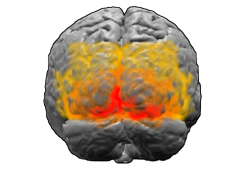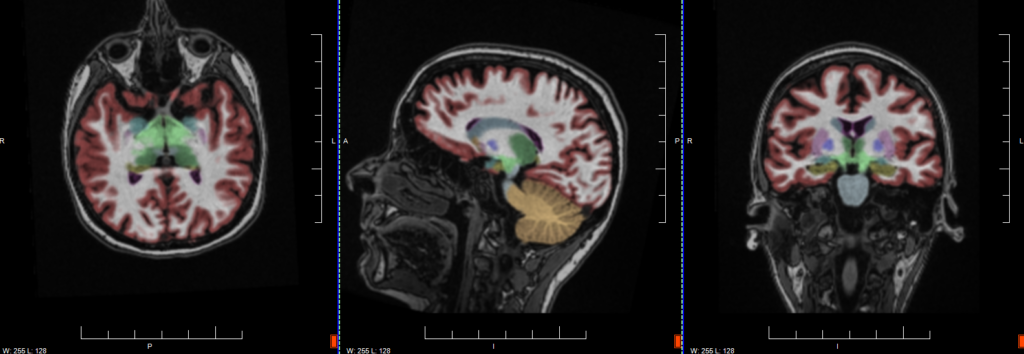Posterior = Back
Cortical = Outer layer of brain
Atrophy = Loss of neural cells and connections

Posterior cortical atrophy (PCA) is a progressive neurodegenerative syndrome that initially affects the visual perception system located in the back of the brain. Most cases are found to stem from Alzheimer’s pathology and therefore PCA has been traditionally classified as a rare visual variant of that disease. Over time, the atrophy can spread into other regions of the brain resulting in typical dementia symptoms (e.g., memory issues).

Alzheimer’s with dementia normally develops after the age of 65 but PCA can have a much younger onset age. Although most people living with PCA are diagnosed with the syndrome between the ages of 50 and 60, others may begin suffering symptoms in their forties.
Common Symptoms
The symptoms of PCA can vary across patients and change as the condition progresses.
PCA Patients May Present With
Blurry Vision
Light Sensitivity
Or may have Difficulty With
Reading
Writing
Drawing
Dressing
Navigating Familiar Places
Reaching for Objects
Stepping Off Curbs
Tripping
Descending Stairs
Finding Objects "Right in Front of Their Eyes"
Using Keyboards
Dialing Phones
Using Remotes
Missing Table When Setting Objects Down
Running into Doorways
Environmental Disorientation
Loss of Peripheral Vision
Basic Calulations
Visual Hallucinations
The ability to interact with and make sense of the visual world is often severely affected in PCA.
I Can See But I Can't See
Objects may appear to move, popping in and out of the visual field. It is not unusual for someone living with PCA to be able to see something as small as a pill on the ground but be unable to see things right in front of their faces.
Seeing the Trees But Not the Forest
One symptom of PCA is being able to recognize individual elements of a complex visual scene but they are unable to grasp the overall meaning.
Language
Although language abilities are relatively spared, some individuals diagnosed with PCA have difficulty with word finding and language comprehension. Therefore, they may exhibit tangential conversational styles that lack focus.
Living with PCA
Accurate and Timely Diagnosis is Important!
“Doctors told me my vision was fine and that my symptoms were due to stress and trauma. Symptoms like having difficulty with reading, basic calculations, and finding words. These were skills that I had excelled at my entire life and used every day as a professor! Being unable to find things right in front of me and getting lost on campus. Even seeing a polar bear on the side of the Florida highway. So I began to doubt and blame myself. I even quit my job. When I suggested an early onset Alzheimer’s, I was told I was too young. Five years later, when a doctor confirmed my suspicion, it was a relief. At least I understand why I am declining. One of the care partners of another PCA patient says it best. “Don’t be mad at yourself. It’s the PCA and you haven’t done anything wrong!”

Research
Crutch, S. J., Schott, J. M., Rabinovici, G. D., Murray, M., Snowden, J. S., van der Flier, W. M., et al. (2017). Consensus classification of posterior cortical atrophy. Alzheimer’s & Dementia, 13, 870-884. Article
Firth, N. C., Primativo, S. Marinescu, R. V., Shakespeare, T. J. Suarez-Gonzalez, A. Lehmann, M., et al. (2019). Longitudinal neuroanatomical and cognitive progression of posterior cortical atrophy, Brain, 142(7), 2082–2095. Article
Holden, S. K., Bettcher, B. M., & Pelak, V. S. (2020). Update on posterior cortical atrophy. Current Opinion in Neurology, 33(1), 68-73. Article
Wong, B., Lucente, D. E., MacLean, J., Padmanabhan, J., Quimby, M., Brandt, K. D., et al. (2019). Diagnostic evaluation and monitoring of patients with posterior cortical atrophy. Neurodegenerative Disease Management, 9(4), 217–239. Article
It Is Time To Talk About
Posterior Cortical Atrophy

Feeling lost after receiving her diagnosis, Dr. Mize began a PCA research project. We talk to the medical experts, but the goal is to give other patients a voice in the discussion about PCA while raising awareness of the syndrome.

Even if PCA has taken away your ability to read and write, your experience can have a powerful impact. If you, or a loved one, are living with PCA, contact us to discuss how sharing your experience can help others.

Our educational talks include excerpts from interviews with medical professionals. Although they are knowledgeable, the most valuable information comes from those living with PCA. Contact us to arrange to hear from these PCA experts.
Others Can Help
Adults over 40 and are healthy or diagnosed with typical variants of Alzheimer’s disease or other neurodegenerative conditions can help us learn about differential susceptibility and brain health by completing a short 5-minute survey. Express your interest in participating in this related line of research by filling out our research interest form.
About Me
Educator • Researcher • Author • Guide Dog Handler
I am currently an Assistant Professor at Florida Gulf Coast University. Using evolutionary psychological theory as an overarching theme, I focus on behavioral and psychophysiological measures to study development across the lifespan. My primary interests are social relationships and emotions although I often explore other topics, including PCA.
As a PCA Patient...
I am learning to live again with the assistance of a good medical team, family support, and my guide dog.
Achievements
PhD
Experimental Psychology
MA
Psychology
BA
Experimental Psychology
